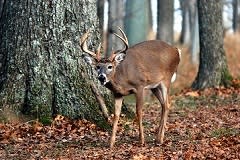Anticipation Builds as Kentucky Deer Season Nears Peak

It is mid-October and anticipation builds as Kentucky’s deer season nears its peak: the opening of modern gun season.
This year’s opening day on Nov. 10 is timed to coincide with the onset of the rut, the white-tailed deer’s annual mating season.
Here are some observations at this stage of the season:
The archery harvest continues to make news. Hunters took a record 5,578 deer during September.
It was the first time the archery harvest during September exceeded 5,000 and the fifth straight year that archers achieved a record harvest during the opening month of bow season. The season harvest total by archers has also risen the past five years, from 13,941 in the 2007-2008 archery deer season to 18,170 last season.
“In the Zone 1 and Zone 2 counties it’s important that there are more than 50 percent does in the harvest. This slows growth, improves sex ratios, and generally helps to stabilize herds,” said Tina Brunjes, big game coordinator for the Kentucky Department of Fish and Wildlife Resources. “The continued harvest of does is a key component in our harvest strategy.”
About 25 percent of successful deer hunters take two or more deer. The overall statewide harvest is expected to remain in the range of 110,000 to 120,000 deer a year, since the number of hunters is stable.
The overall age structure of the deer harvest indicates hunters are passing up young deer.
“The majority of antlered bucks taken during the 2011-12 season were at least 2 1/2 years old,” said Brunjes. “Female age class distribution in the harvest was nearly identical. Most does taken were mature adults, 2 1/2 years old or older. The harvest of older does should be a priority to maintain a healthy, balanced herd.”
Adult does are more likely to have twins and they tend to run off the yearling bucks in their range.
The trend of hunters passing on young deer is reflected by the statistics on trophy deer taken in Kentucky. These stats are compelling.
During the past three seasons, 172 deer reported to Kentucky Fish and Wildlife qualified for entry into the Boone & Crockett record book, including a record 68 taken during the 2011-2012 season deer season.
Last season, the trophy deer taken in Kentucky came from 44 different Kentucky counties. In the past three seasons, trophy deer have been harvested from 81 of 120 Kentucky counties.
Some of the Kentucky counties that produced the most Boone & Crockett record book deer the past three seasons include: Ohio and Whitley, seven deer; Casey, Greenup and Hardin, six deer; Boone and Owen, five deer; Christian, Lewis, Shelby and Todd, four deer, and Bracken, Campbell, Fulton, Gallatin, Henry, Kenton and McLean, three deer.
“Kentucky deer hunters have an opportunity to harvest trophy class deer in virtually any county,” said Brunjes.
Despite the hot, dry summer, wildlife biologists found a statewide average of 52 percent of the white oaks and 66 percent of the red oaks produced acorns this year. “Based on what we observed, this year’s mast crop is rated average for white oaks (40 to 59 percent of trees produced mast), and good for red oaks (60 to 79 percent),” said Ben Robinson, wildlife biologist for Kentucky Fish and Wildlife.
The lone exception is the beechnut crop. “The beech crop was rated as a failure,” said Robinson. “Only 19 percent of the beech trees observed had nuts.”
Beech trees are found throughout Kentucky, and are a favorite food of deer when available. The greatest numbers of beech trees are in central and eastern Kentucky.
This deer season is a highly productive one so far. Signs point to excellent deer hunting in the coming weeks.

